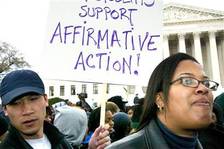 Here's one of the arguments opposing Affirmative Action: as long as we continue to discuss race and make race an issue we'll never be able to put race behind us. Some opponents of Affirmative Action feel that we need to move beyond it. The battle is over. This goes for gender equality also. The issue at hand is not if there is a need for Affirmative Action but if it's still constitutionally relevant, after all we do have an African American president. Taking this one step further, if AA is constitutionally relevant, does a State have the right to ban it? There's a push for these decisions to be made at the state level. California, Oklahoma, and Michigan passed legislation to ban AA, Michigan's law was overturned. In a Los Angeles Times editorial entitled "Affirmative action and the law" the writer states: "Instead of asking courts to roll back unfavorable referendums, advocates of affirmative action in Michigan, California and elsewhere need to make their case to the public the way Ward Connerly and his allies made theirs." Affirmative action began as a tool to address the persistent discrimination against African Americans in the 1960s. This specific term was first used to describe US government policy in 1961. Directed to all government contracting agencies, President John F. Kennedy's Executive Order 10925 mandated "affirmative action to ensure that applicants are employed, and that employees are treated during employment, without regard to their race, creed, color, or national origin." President Lyndon B. Johnson expanded the executive order to include discrimination on account of sex. President Johnson's position on Affirmative Action was clear: "Nothing is more freighted with meaning for our own destiny than the revolution of the Negro American...In far too many ways American Negroes have been another nation: deprived of freedom, crippled by hatred, the doors of opportunity closed to hope...But freedom is not enough. You do not wipe away the scars of centuries by saying: Now you are free to go where you want, and do as you desire, and choose the leaders you please. You do not take a person who, for years, has been hobbled by chains and liberate him, bring him up to the starting line of a race and then say, 'you are free to compete with all the others,' and still justly believe that you have been completely fair...This is the next and the more profound stage of the battle for civil rights. We seek not just freedom but opportunity. We seek not just legal equity but human ability, not just equality as a right and a theory but equality as a fact and equality as a result...To this end equal opportunity is essential, but not enough, not enough" President Johnson further elaborated his position by saying: "Men and women of all races are born with the same range of abilities. But ability is not just the product of birth. Ability is stretched or stunted by the family that you live with, and the neighborhood you live in--by the school you go to and the poverty or the richness of your surroundings. It is the product of a hundred unseen forces playing upon the little infant, the child, and finally the man" The future of Affirmative Action as we know it is at stake. There are questions that must be discussed and addressed. Do we believe that every citizen in the United States has the right to a fair and equal opportunity to succeed? Should this right be protected? Is equal treatment being categorized as preferential treatment? Do voters have the right to ban AA?
Let's not lose sight of what's at risk. |
EditorErnest R. Heyward is the Founder and President of the Marketplace for Social Awareness and Social Responsibility Inc. Categories
All
Archives
June 2020
|
MARKETPLACE FOR SOCIAL AWARENESS AND SOCIAL RESPONSIBILITY INC.



